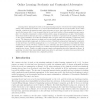Free Online Productivity Tools
i2Speak
i2Symbol
i2OCR
iTex2Img
iWeb2Print
iWeb2Shot
i2Type
iPdf2Split
iPdf2Merge
i2Bopomofo
i2Arabic
i2Style
i2Image
i2PDF
iLatex2Rtf
Sci2ools
CORR
2011
Springer
2011
Springer
Online Learning: Stochastic and Constrained Adversaries
Learning theory has largely focused on two main learning scenarios. The first is the classical statistical setting where instances are drawn i.i.d. from a fixed distribution and the second scenario is the online learning, completely adversarial scenario where adversary at every time step picks the worst instance to provide the learner with. It can be argued that in the real world neither of these assumptions are reasonable. It is therefore important to study problems with a range of assumptions on data. Unfortunately, theoretical results in this area are scarce, possibly due to absence of general tools for analysis. Focusing on the regret formulation, we define the minimax value of a game where the adversary is restricted in his moves. The framework captures stochastic and non-stochastic assumptions on data. Building on the sequential symmetrization approach, we define a notion of distribution-dependent Rademacher complexity for the spectrum of problems ranging from i.i.d. to wors...
| Added | 26 Aug 2011 |
| Updated | 26 Aug 2011 |
| Type | Journal |
| Year | 2011 |
| Where | CORR |
| Authors | Alexander Rakhlin, Karthik Sridharan, Ambuj Tewari |
Comments (0)

